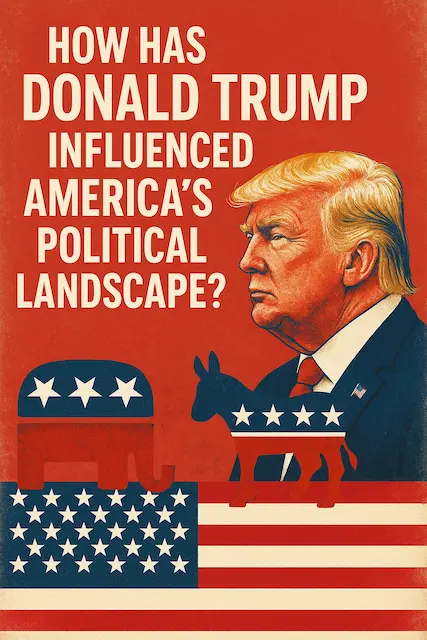The era of Donald Trump has been a defining period in American history, marked by significant shifts in political dynamics, policy changes, and societal reactions. From his unexpected rise to the presidency to the controversies that followed, understanding this era is crucial to grasping the current state of America.
This article explores various facets of America in the age of Trump, focusing on his influence on politics, key events during his presidency, public perception, international relations, and the controversies that have shaped his legacy.
How has Donald Trump influenced America’s political landscape?

Donald Trump’s presidency has dramatically altered the political landscape of the United States. His approach to governance has shifted the norms of political discourse, creating a more polarized environment. Trump’s emphasis on populism resonated with many voters who felt ignored by traditional politicians.
Additionally, Trump’s administration has seen the rise of a new breed of Republican politics, characterized by an embrace of anti-establishment rhetoric. This shift has redefined the Republican Party, catering more to the base and less to moderate voices. Trump’s impact is evident in the way his supporters view traditional institutions, often questioning their legitimacy.
Moreover, the concept of “fake news” became a staple of Trump’s narrative, further intensifying distrust in mainstream media. This rhetoric has had lasting effects on how information is consumed and shared, reshaping the public’s perception of truth and accountability.
What are the key events during Trump’s first presidency?
Trump’s first term was marked by numerous significant events that encapsulated his controversial presidency. One of the most pivotal moments was the Capitol attack on January 6, 2021, which highlighted the extreme divisions within American society. This incident resulted in Trump’s second impeachment, a first in U.S. history.
Another key event was his administration’s response to the COVID-19 pandemic, which was widely criticized for its handling. The late acknowledgment of the virus’s severity led to a significant public backlash. Americans were left grappling with confusion and mixed messages regarding health guidelines and government response.
Additionally, Trump’s foreign policy actions, including the withdrawal from the Iran nuclear deal and the initiation of trade wars, significantly impacted international relations. These decisions sparked debates about America’s role on the global stage.
How do Americans perceive Trump’s second term?
As Trump prepares for a potential second term in 2025, public perception remains deeply divided. Supporters view him as a champion of conservative values, while critics see him as a threat to democracy. This division is reflected in polling data, which shows a stark contrast in approval ratings among different demographics.
Many Americans express concern about the implications of Trump’s return, especially regarding issues such as immigration, healthcare, and environmental policies. The discussions surrounding these topics are often heated, demonstrating the ongoing polarization in the country.
Furthermore, Trump’s influence on the Republican Party continues to be a topic of debate. Many candidates align themselves with his policies to appeal to his base, while others fear the long-term consequences of his leadership style on the party’s future.
What impact did Trump have on international relations?
Trump’s approach to foreign policy marked a significant departure from previous administrations. His “America First” doctrine prioritized American interests over global cooperation. This policy shift resulted in strained relationships with traditional allies and a warmer stance towards authoritarian regimes.
One notable outcome was the tension with NATO allies, where Trump openly criticized member countries for not meeting their financial commitments. This created uncertainty about America’s role in global security and its commitment to multilateral agreements.
Moreover, Trump’s administration saw a focus on bilateral negotiations, particularly with countries like North Korea. His historic meetings with Kim Jong-un were groundbreaking but ultimately did not lead to substantial policy changes.
How do Trump’s policies affect American democracy?
The policies implemented during Trump’s presidency have raised serious questions about the state of American democracy. His administration’s challenges to electoral integrity, particularly before and after the 2020 elections, threatened the foundational principles of democratic governance.
Moreover, Trump’s rhetoric often undermined trust in electoral processes, leading to increased fears of voter suppression and challenges to voting rights. The implications of these actions are likely to be felt for years to come as debates over election security and integrity continue.
Additionally, the normalization of aggressive political tactics and rhetoric has contributed to a more hostile political environment. This shift raises concerns about the future health of American democracy and the ability to engage in civil discourse.
What are the controversies surrounding Trump’s leadership?
Trump’s presidency was engulfed in controversies, many of which had lasting implications. His approach to race relations, particularly following events like the protests after George Floyd’s death, sparked national outrage and debate. Critics accused him of exacerbating racial tensions, while supporters argued he focused on law and order.
The use of social media as a tool for communication was another contentious issue. Trump’s frequent use of Twitter to bypass traditional media led to significant backlash, resulting in his eventual suspension from the platform after the Capitol riots.
Moreover, the investigations into his personal business dealings and the impeachment trials underscored the challenges of ethical governance. These controversies have fueled ongoing discussions about accountability and transparency in leadership.
What is the legacy of Donald Trump in American history?
As historians reflect on Trump’s presidency, his legacy is likely to be viewed through a complex lens. His impact on the Republican Party, American democracy, and international relations will be debated for years. Many consider him a transformative figure, having reshaped political norms and party dynamics.
Trump’s presidency also highlighted the deep-seated divisions within American society, prompting discussions about unity and governance. His controversial policies may influence future generations as they grapple with the implications of his leadership style.
Ultimately, Trump’s legacy will likely serve as a case study in the evolution of American politics, offering lessons on the power of populism and the challenges of maintaining democratic institutions.
Related questions about Trump’s era
What age is Joe Biden?
Joe Biden was born on November 20, 1942, making him 81 years old. His age at the time of his election in 2020 was a topic of discussion, especially regarding his experience and capability to lead.
What age was Barack Obama when elected?
Barack Obama was 47 years old when he was elected as the 44th President of the United States in 2008. His relatively young age compared to previous presidents was often highlighted as a fresh perspective in American politics.
What is Melania Trump’s age?
Melania Trump was born on April 26, 1970, making her 53 years old. As the First Lady, she focused on various charitable initiatives, particularly related to children’s well-being.
How old was Joe Biden when he was elected?
Joe Biden was 77 years old when he was elected president in 2020. His extensive career in politics has been marked by numerous accomplishments and challenges, influencing public perception of his age.
What is Barron Trump’s age?
Barron Trump, the son of Donald Trump and Melania Trump, was born on March 20, 2006. He is currently 17 years old and has largely stayed out of the political spotlight compared to his older siblings.
What is Kamala Harris’s age?
Kamala Harris was born on October 20, 1964, making her 58 years old. As the first female Vice President, she has played a crucial role in shaping the current administration’s policies and initiatives.



